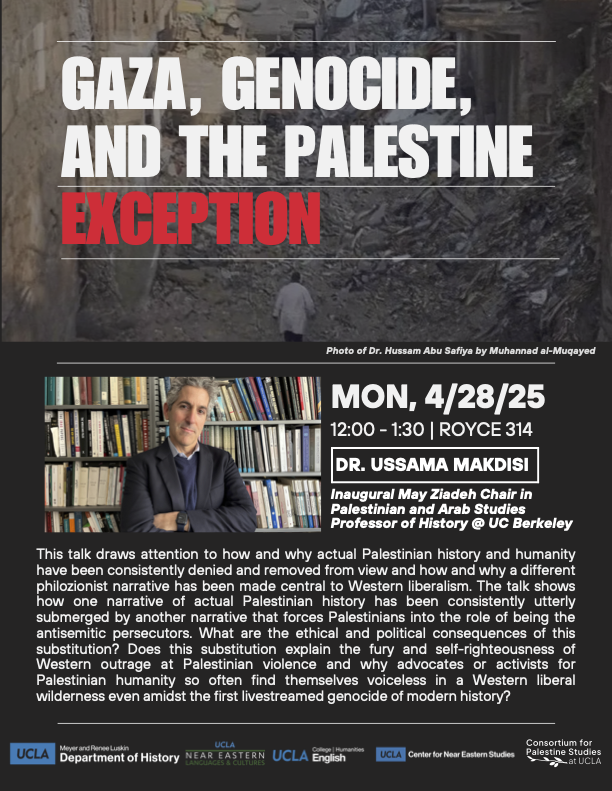Ussama Makdisi - Gaza, Genocide, and the Palestine Exception

Ussama Makdisi - Gaza, Genocide, and the Palestine Exception
Monday, April 28, 2025
12:00 – 1:30pm
Royce Hall Room 314, UCLA
Light lunch from Panini Kabob Grill will be served on a first come, first serve basis.
This talk draws attention to how and why actual Palestinian history and humanity have been consistently denied and removed from view and how and why a different philozionist narrative has been made central to Western liberalism. The talk shows how one narrative of actual Palestinian history has been consistently utterly submerged by another narrative that forces Palestinians into the role of being the antisemitic persecutors. What are the ethical and political consequences of this substitution? Does this substitution explain the fury and self-righteousness of Western outrage at Palestinian violence and why advocates or activists for Palestinian humanity so often find themselves voiceless in a Western liberal wilderness even amidst the first livestreamed genocide of modern history?
This event is hosted by the History Department and co-sponsored by the Near Eastern Languages and Cultures Department, the English Department, the Center for Near Eastern Studies, and the Consortium for Palestine Studies.
Bio:
Dr. Ussama Makdisi is Professor of History and Chancellor’s Chair at the University of California Berkeley. He was previously Professor of History and the first holder of the Arab-American Educational Foundation Chair of Arab Studies at Rice University in Houston. During AY 2019-2020, Professor Makdisi was a Visiting Professor at the University of California at Berkeley in the Department of History. In 2012-2013, Makdisi was an invited Resident Fellow at the Wissenschaftskolleg zu Berlin (Institute for Advanced Study, Berlin). In April 2009, the Carnegie Corporation named Makdisi a 2009 Carnegie Scholar as part of its effort to promote original scholarship regarding Muslim societies and communities, both in the United States and abroad. Makdisi was awarded the Berlin Prize and spent the Spring 2018 semester as a Fellow at the American Academy of Berlin.
Professor Makdisi’s most recent book Age of Coexistence: The Ecumenical Frame and the Making of the Modern Arab World was published in 2019 by the University of California Press. He is also the author of Faith Misplaced: the Broken Promise of U.S.-Arab Relations, 1820-2001 (Public Affairs, 2010). His previous books include Artillery of Heaven: American Missionaries and the Failed Conversion of the Middle East (Cornell University Press, 2008), which was the winner of the 2008 Albert Hourani Book Award from the Middle East Studies Association, the 2009 John Hope Franklin Prize of the American Studies Association, and a co-winner of the 2009 British-Kuwait Friendship Society Book Prize given by the British Society for Middle Eastern Studies.
Makdisi is also the author of The Culture of Sectarianism: Community, History, and Violence in Nineteenth-Century Ottoman Lebanon (University of California Press, 2000) and co-editor of Memory and Violence in the Middle East and North Africa (Indiana University Press, 2006). He has published widely on Ottoman and Arab history as well as on U.S.-Arab relations and U.S. missionary work in the Middle East. Among his major articles are “Anti-Americanism in the Arab World: An Interpretation of Brief History” which appeared in the Journal of American History and “Ottoman Orientalism” and “Reclaiming the Land of the Bible: Missionaries, Secularism, and Evangelical Modernity” both of which appeared in the American Historical Review. Professor Makdisi has also published in the International Journal of Middle East Studies, Comparative Studies in Society and History, and in the Middle East Report.
